STS loaded PCL-MECM based hydrogel hybrid scaffolds promote meniscal regeneration via modulating macrophage phenotype polarization†
Abstract
Meniscus injury has a limited ability to heal itself and often results in the progression to osteoarthritis. After a meniscus injury, there is an obvious acute or chronic inflammatory response in the articular cavity, which is not conducive to tissue regeneration. M2 macrophages are involved in tissue repair and remodeling. Regenerative medicine strategies for tissue regeneration by enhancing the phenotypic ratio of M2 : M1 macrophages have been demonstrated in a variety of tissues. However, there are no relevant reports in the field of meniscus tissue regeneration. In this study, we confirmed that sodium tanshinone IIA sulfonate (STS) could transform macrophages from M1 to M2 polarization. STS protects meniscal fibrochondrocytes (MFCs) against the effects of macrophage conditioned medium (CM). Moreover, STS attenuates interleukin (IL)-1β-induced inflammation, oxidative stress, apoptosis, and extracellular matrix (ECM) degradation in MFCs, possibly by inhibiting the interleukin-1 receptor-associated kinase 4 (IRAK4)/TNFR-associated factor 6 (TRAF6)/nuclear factor-kappaB (NF-κB) signaling pathway. An STS loaded polycaprolactone (PCL)-meniscus extracellular matrix (MECM) based hydrogel hybrid scaffold was fabricated. PCL provides mechanical support, the MECM based hydrogel provides a microenvironment conducive to cell proliferation and differentiation, and STS is used to drive M2 polarization and protect MFCs against the effects of inflammatory stimuli, thus providing an immune microenvironment conducive to regeneration. The results of subcutaneous implantation in vivo showed that hybrid scaffolds could induce M2 polarization in the early stage. In addition, the hybrid scaffolds seeded with MFCs could achieve good meniscus regeneration and chondroprotective effects in rabbits.



 Please wait while we load your content...
Please wait while we load your content...